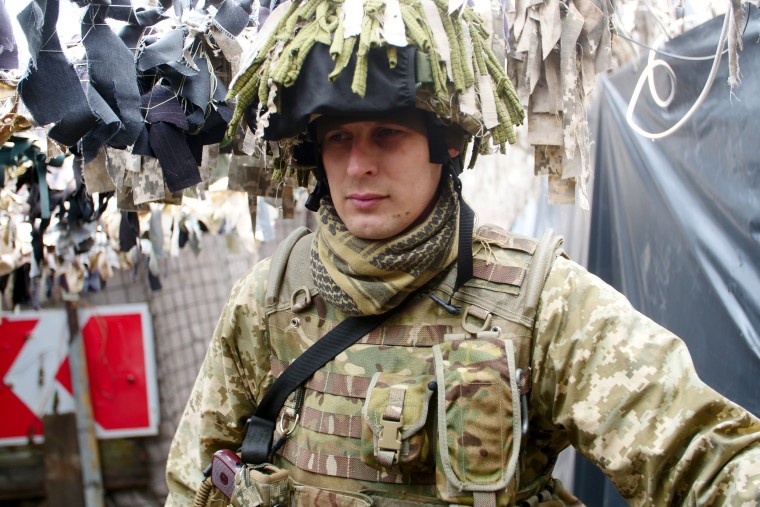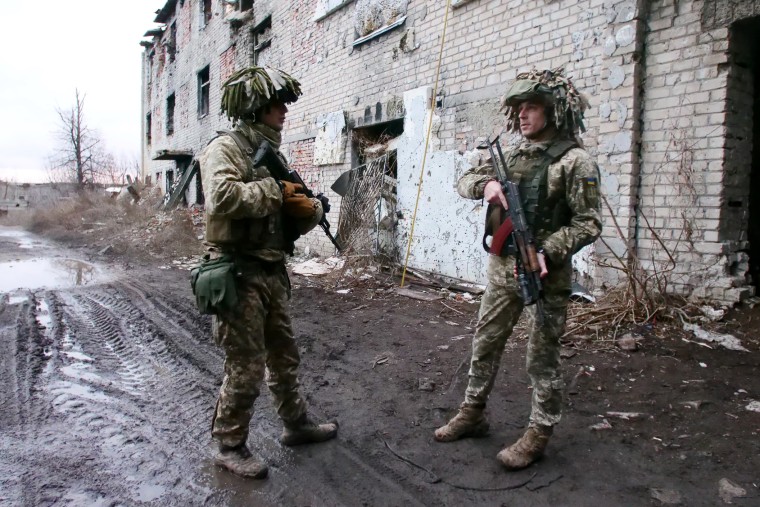AVDIIVKA, Ukraine — On the eastern edge of Ukraine are scenes reminiscent of World War I.
Freezing troops peer through periscopes above deep trenches on the country’s front line at pro-Russian separatists, who are as little as 50 yards away. On Thursday, the trenches were muddy quagmires but are often frozen solid, offering little comfort from the inhospitable cold.
The military men and women in the eastern city of Avdiivka are on high alert as consternation over an imminent Russian invasion of Ukraine spreads through Europe and beyond. Leave has been canceled and the troops are bracing themselves to spend the holidays huddled in the cold.
Lt. Ivan Skuratovsky, who enlisted in 2013, describes the current situation as a stalemate between the Ukrainian troops and the pro-Russian forces in the breakaway region of Donetsk.
“We have trenches with guys, they have trenches with guys,” the 30-year-old said. “If Russia starts a war, of course we will have casualties, and also they will have casualties.”
In addition to the long-running battles with separatists, the buildup of some 100,000 Russian troops along the Ukrainian border has alarmed Western leaders as they try to decipher Moscow's saber-rattling — is the Kremlin readying a devastating assault?
But front-line positions like this one are a reminder that the war was already well underway, and Ukrainian troops say they are now desperate not to give the Russians an excuse for further escalation.

Soldiers who patrol the trenches dug into a former village in the industrial side of town say exchanges of gunfire and shelling are a near-daily occurrence, with both sides dug into positions that have hardly moved since the conflict first broke out in 2014.
Soldiers warn of land mines in the no man’s land that surrounds the area, while the derelict brick homes that have been hit and collapsed in past artillery barrages, look like relics of long-ago battles, but are in fact casualties of a conflict less than a decade old.
The Ukrainians say they want to avoid prompting Russia and its proxies into an escalated fight. This cautious approach is now no doubt heightened as President Joe Biden has made it clear U.S. troops are not about to unilaterally come and rescue Ukraine.
“The enemy is constantly provoking us here,” said Mykhailo, a 25-year-old senior lieutenant who declined to give his last name.
“If there is provocation towards us, we don’t respond to the provocation. If there is a targeted shooting and there is a threat to our lives, then we respond,” he said.
Biden and America's NATO allies have sought to de-escalate tensions with Russia, which has been ratcheting up pressure on Ukraine since a popular revolution ousted pro-Russian President Viktor Yanukovych in 2014.
Russian-backed separatists have taken control of large parts of eastern Ukraine, in Donetsk and neighboring Luhansk province, while Russia also annexed Ukraine's Crimean Peninsula in 2014.

Moscow has long said it was seeking to protect pro-Russian populations in these areas of Ukraine, and has justified the expansion of forces as its own defense against the threat it perceives from NATO, and concerns that Ukraine could become a part of the trans-Atlantic alliance.
If tensions do escalate, a place like Avdiivka, on the front line of the simmering conflict, could see war come to full boil.
Skuratovsky warns that if that happens, the fighting could spread beyond Ukraine and into the rest of Europe.
“Putin, I think, will not stop in Ukraine. If we don’t stop it here, they go further, because history shows us that leaders like Putin don’t stop until whole world stop it.”
